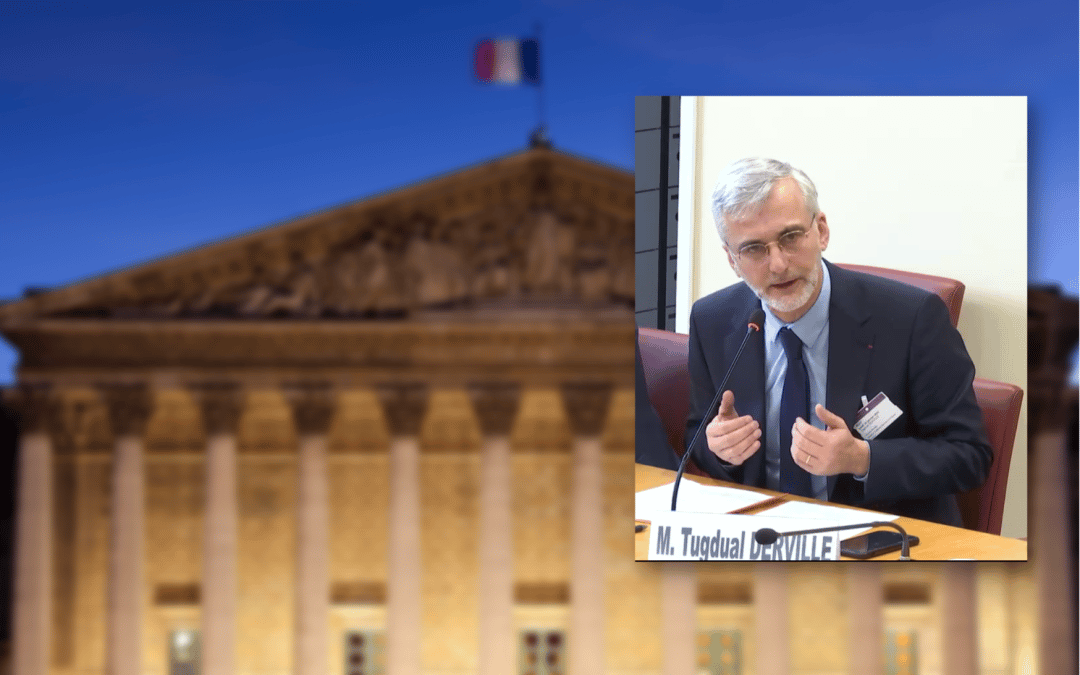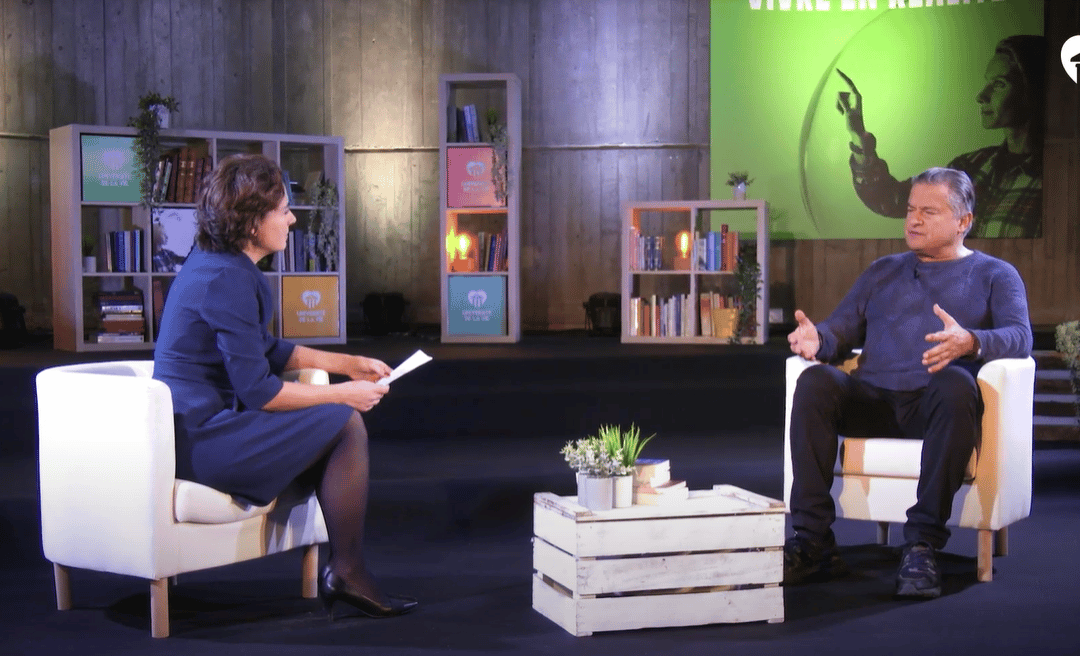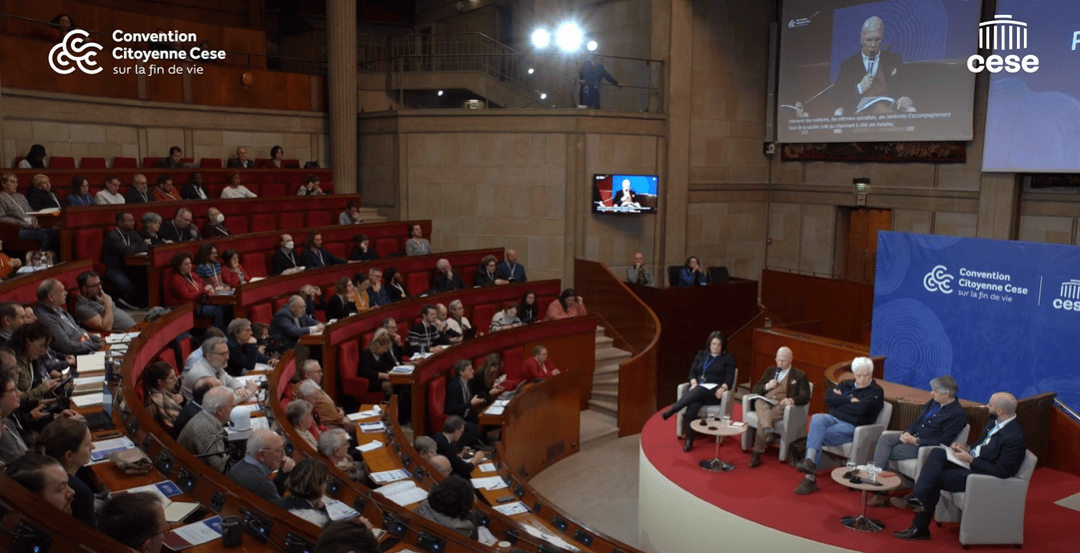The members of the Citizens’ Convention reconvened between Friday 20th and Sunday 22nd January, for the second session of the deliberation phase. During this session, successive round tables were organized involving carers, associations and representatives of foreign states.
An international round table which revealed deviations
In response to the requests of certain citizens wishing to hear about foreign experience other than from Belgium and Switzerland, a new round table was arranged on the Friday afternoon, where only states having legalised euthanasia or assisted suicide were represented. Those taking part were Théo Boer, an ex-member of the euthanasia supervisory committee in Holland, Michel Bureau, president of the end of life care commission in Quebec, Joelle Osterhaus, manager of the psycho-social services in a palliative care unit in Portland (Oregon), in the United States, and Francesca Re, a lawyer for the Luca Coscioni association, which is militating for euthanasia in Italy.
In Quebec and in Holland, the statistics presented indicated a considerable increase in the number of cases since legalisation, which is even more impressive in Quebec where euthanasia was legalized in 2015. Deaths by euthanasia currently represent 5% of the total number of deaths in Holland as in Quebec, and 10.9% of deaths of people suffering from cancer in Quebec. In Holland, where deaths by euthanasia have reached 20% of deaths in certain areas, “the increase appears to be still growing”, whilst the number of violent suicides is also increasing.
Théo Boer, the author of a column published in Le Monde last December, warned of the difficulty of containing requests for euthanasia within a strict framework. “I believe that not one state in the world has managed to maintain the practice within the limits of their initial objectives. Wherever euthanasia has been legalised, the logic is the same. Why is euthanasia allowed for A and not for B?”.
In Oregon, the law limits assisted suicide to patients suffering from a disease in its terminal phase, with a life expectancy of less than six months. However, the figures presented by Joelle Osterhaus reveal that the main reasons for requesting assisted suicide in Oregon are the loss of autonomy (93%) as well as “a reduced capacity to take part in activities which make life agreeable” (89%).
The means implemented for end of life accompaniment
The members of the Citizens’ Convention then took part in another round table on “the means implemented in the context of the Claeys-Leonetti law and the 2021-2024 palliative care plan”.
After the presentation by Louis-Charles Viossat of the report by IGAS (Inspection Générale des Affaires Sociales: General inspectorate for social affairs) published in 2018, Olivier Mermet and Bruno Richard, drivers of the 2021-2024 national plan for the development of palliative care were able to present the details of the plan.
The questions asked by the members underlined the lack of ambition of the plan, with its meagre budget of 180 million euros, compared with 1.7 billion euros for the fight against cancer. Thus, for example, the plan covers the creation of a mere three posts as palliative medicine instructors.
Round table on refractory suffering
The third and last round table of the week-end concerned refractory suffering and included both doctors and patient associations.
The different contributions highlighted the progress being made in pain relief and the possibility of resorting to deep sedation in order to avoid refractory suffering. Nevertheless, there remains a proportion of patients, even if small, whose pain cannot be relieved. In such situations, doctor Stéphane Picard, an algologist, pleaded for the “moral contract” established with patients, which commits carers not to abandon them and to remain with them right up to the end.
The various speakers insisted strongly on the crucial importance of accompaniment. According to Francis Jubert, a coordinator of palliative care teams in the home, “staying close to a deeply sick patient, is a form of natural sedation in full consciousness.” Because quite apart from physical pain, one cannot neglect the burden of psychological and existential suffering.
Thus Nathalie Maka, a member of the Charcot Solidarity Collective, gave a testimony of the suffering associated with Charcot’s disease, both for the person directly concerned and for the patient’s family. She expressed the feeling of abandonment experienced by patients in the absence of any medical or psychological supervision immediately after announcement of the diagnosis. Patients suffering from ALS are not sufficiently cared for either in hospital or at home. The isolation can lead patients to ask to die. The organisation of better care should be made a priority.
In view of the shortcomings of the care system for patients being left to their solitude, Francis Jubert launched an appeal for solidarity: “It is up to you to motivate yourselves to be more present for patients in end of life situations.”
Finally, a member asked the ex-president of the French Federation of Psychiatrists, Jean-Jacques Bonamour du Tartre, for his opinion on the possibility of authorising assisted suicide for patients suffering from psychiatric pathologies. Mentioning the fluctuations over time of such requests, he stressed the responsibility of psychiatrists to eliminate suicidal thoughts: “Our work, is to avoid people resorting to suicide and we have quite a task on our hands!”
346 proposals on the end of life
At the end of this fourth session, the citizens registered 346 preliminary proposals and began to attempt to establish them in order of priority.



![[Press release] Abortion in the Constitution: Alliance VITA Deplores the Vote by the Senate](https://www.alliancevita.org/wp-content/uploads/2023/02/IVG-dans-la-Constitution-Alliance-VITA-deplore-le-vote-du-Senat-avortement-1080x675.png)

